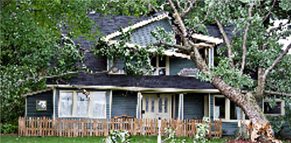Frequently Asked Questions
Homeowner’s Insurance FAQs
How much homeowners insurance is enough?
Most people find that “enough” means a sufficient amount to rebuild their home. Remember that the foundation and the land are not covered under the policy and therefore will not figure into an insurance settlement. When determining the replacement cost of your home, do not use the sales price, the tax assessment or the value the mortgage company calculated. All these can vary greatly from the construction costs.
You should also evaluate your personal belongings and ask us about the options for covering these items. Most homeowners’ policies include personal liability protection. Be sure to speak with your agent concerning your liability coverage needs.
What will affect the price of my homeowner’s insurance?
There are several factors that go into the cost of homeowner’s insurance. An example is the type of construction, where frame houses usually cost more to insure than brick. The age of the house is also a factor. Since newer homes should have fewer problems, they generally qualify for a discount. Does your neighborhood have adequate fire protection, fire hydrants, etc. If not, this will cost you a bit more.
How quickly will my possessions be replaced if I file a claim?
Each insurance carrier has a different policy on filing claims but the nature of the claim has the greatest effect on how quickly it is processed. Also, the specific article that was lost and your insurance carrier’s policy affect the turn around rate. We only represent strong, reputable insurance carriers that have a high rating on customer service.
What is covered in a Basic Homeowner’s Insurance Policy?
Property Damage Coverage
“Property Damage” coverage is designed to help pay for damage to your home and personal property. “Other Structures” coverage will help protect your detached garage, tool shed, and other unattached structures. Generally, the coverage is 10% of the amount for which your home is insured.
“Personal Property” coverage helps pay for a loss of your personal possessions, such as clothing, furniture, TV, stereo and other unattached personal items. You may want to review this coverage with us, to make sure you are adequately protected in this area.
If you need additional coverage for higher valued items, please ask us.
Personal Property Floater
A homeowners insurance policy normally provides limited coverage for collectibles, jewelry, furs, etc. It may be necessary to insure your valuables with a Personal Property Floater. A Personal Property Floater itemizes each item, gives a description of the item insured, and lists excluded perils. It normally provides coverage that is broader than the coverage in your standard homeowners insurance policy. Please ask us if you need an evaluation of your risk in this area.
Personal Liability Coverage
Your homeowners policy provides Personal Liability coverage to help protect you against a non-auto claim in which you were at fault. Liability coverage in your homeowners insurance policy covers both the cost of defending you and damages the court orders you must pay. Liability insurance does not have a deductible that you must meet before the insurer begins to pay losses. We can review your current limits of coverage, and help make sure you have enough protection in this area.
Medical Payments Coverage
Medical Payments coverage is designed to pay for an injury to someone OUTSIDE your family. It can often help settle “small” injuries outside of court before they become BIG claims in court. This is not medical coverage for you and your family.
Additional Living Expenses
Where will you live if your home is badly damaged? If you have to move into a hotel or apartment for a while because of damage caused by a covered loss, your homeowners insurance policy will normally cover the stay, subject to policy limits.
Business Insurance FAQs
My business is just starting out. Do I need to get insurance right away?
You have to assess if you have liabilities right away. Generally the answer is yes, especially if you have a physical location. If you are renting a space, landlords will require that you have insurance, insuring your Business Personal Property and General Liability. The proof of insurance is usually forwarded by us to your landlord via a Certificate of Insurance. Workers Compensation is required as well.
What do I need to know about Business insurance?
Business insurance is designed to help protect many of the risks your business can face. This includes things like damage or destruction to your business vehicles, office equipment, and inventory. It also includes loss of income in case you have to close-up shop temporarily because of a covered loss as well as crime coverage including robbery, burglary, even employee dishonesty.
Life Insurance FAQs
What Types of Life Insurance are Available?
Term Life Insurance – provides coverage, in the event of the insured person’s death, for a set number of years (a set term). At the end of the term, your past policy can be renewed or sometimes re-written depending on changes in circumstance. Term life insurance is to fill a specific need for a specific period of time.
Permanent Life Insurance – a life insurance policy with a guaranteed payout structure effective so long as the insured person continues paying a fixed annual premium. Depending on the amount of time before benefits are needed, the cost of permanent life insurance may be comparable to or less than that of term life insurance.




